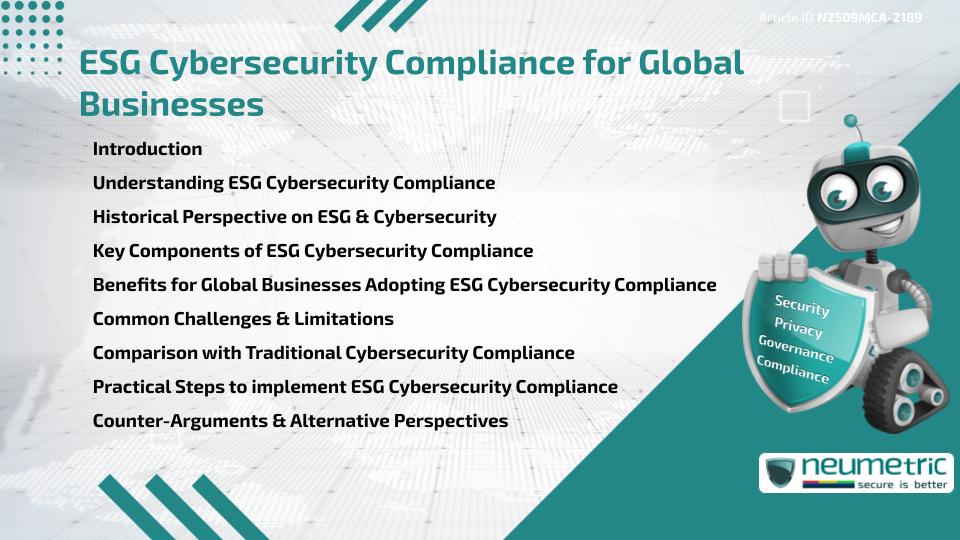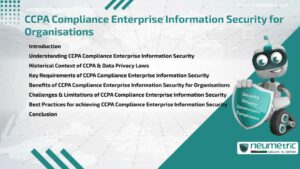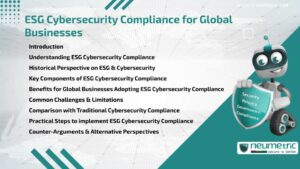Table of Contents
ToggleIntroduction
ESG Cybersecurity Compliance brings together Environmental, Social & Governance [ESG] principles with Cybersecurity practices to create responsible, transparent & secure digital operations. It ensures businesses not only protect Sensitive Data but also align their Security strategies with Sustainability goals & Ethical Standards. For Global Organisations, ESG Cybersecurity Compliance is essential to meet Regulatory Demands, manage Risks & build long-term Trust with Stakeholders. By combining Governance accountability, Sustainable Operations & Digital Protection, these frameworks serve as a foundation for responsible Global Business practices.
Understanding ESG Cybersecurity Compliance
At its core, ESG Cybersecurity Compliance is the integration of ESG values into Cybersecurity Strategies. It involves aligning Data Protection, Risk Management & Information Governance with broader commitments to Sustainability & Social Responsibility. Just as Financial Audits ensure Transparency in Accounting, ESG Cybersecurity Compliance provides assurance that businesses are meeting Ethical & Regulatory expectations in their Digital Operations.
Historical Perspective on ESG & Cybersecurity
The ESG movement began as a way to evaluate businesses beyond profit, focusing on their Environmental footprint, Social impact & Governance practices. In parallel, Cybersecurity evolved to protect Organisations from growing digital Threats. Initially separate, these areas converged when Investors, Regulators & Customers started demanding that businesses demonstrate not only Financial Resilience but also responsible handling of Data & Technology. The development of ESG Cybersecurity Compliance reflects this merging of two critical disciplines to address modern challenges in Global Operations.
Key Components of ESG Cybersecurity Compliance
Most ESG Cybersecurity Compliance frameworks consist of:
- Governance Oversight: Clear roles & responsibilities for Cybersecurity Policies.
- Transparency & Reporting: Regular disclosure of Cybersecurity Risks & Incident Responses.
- Sustainable Practices: Minimising Energy use in Data Centers & adopting Eco-Friendly IT Solutions.
- Social Responsibility: Ensuring Digital Inclusion, Privacy & fair treatment of Stakeholders.
- Regulatory Alignment: Meeting International Standards like GDPR or ISO 27001.
Together, these components ensure Security Measures align with Ethical, Social & Environmental commitments.
Benefits for Global Businesses Adopting ESG Cybersecurity Compliance
Global Businesses adopting ESG Cybersecurity Compliance benefit in several ways:
- Enhanced Trust: Demonstrating a responsible approach to both Data Protection & Sustainability.
- Regulatory Readiness: Staying compliant across multiple Jurisdictions.
- Investor Confidence: Meeting the growing demand for ESG-aligned practices in Risk Management.
- Operational Efficiency: Integrating Sustainability with Security to reduce costs & resource waste.
- Reputation Protection: Building stronger relationships with Customers, Partners & Regulators.
In practice, it acts much like a Safety Certificate for a product-assuring Stakeholders that both quality & responsibility are being addressed.
Common Challenges & Limitations
Despite its advantages, ESG Cybersecurity Compliance presents several challenges:
- The cost of integrating ESG & Cybersecurity Standards.
- Difficulty in measuring & reporting Social & Environmental impacts of Digital Operations.
- Limited Global harmonisation of ESG Reporting Requirements.
- Balancing Innovation with strict Compliance Requirements.
These challenges highlight the need for International Collaboration & ongoing investment in expertise.
Comparison with Traditional Cybersecurity Compliance
Traditional Cybersecurity Compliance frameworks such as SOC 2 or ISO 27001 focus primarily on securing Systems & Data. While highly effective in Risk Reduction, they often overlook Sustainability & Social Impact. ESF Cybersecurity Compliance extends these models by including Accountability for Environmental Practices, Ethical Governance & Digital Inclusivity. For Global Businesses, this integrated approach better reflects Stakeholder expectations in a connected world.
Practical Steps to implement ESG Cybersecurity Compliance
Businesses can adopt ESG Cybersecurity Compliance through the following steps:
- Assessment: Evaluate current Cybersecurity measures alongside ESG objectives.
- Policy Development: Establish Frameworks linking Governance, Sustainability & Security.
- Stakeholder Engagement: Involve Employees, Investors & Customers in ESG-driven Cybersecurity Policies.
- Technology Integration: Adopt Tools that monitor Cybersecurity Risks while reducing Environmental impacts.
- Continuous Reporting: Regularly disclose Compliance efforts & ESG progress.
Counter-Arguments & Alternative Perspectives
Critics argue that ESG Cybersecurity Compliance may overcomplicate Risk Management & impose high costs without immediate benefits. Some believe Traditional Cybersecurity Compliance is sufficient if robustly applied. However, supporters emphasise that integrating ESG principles with Cybersecurity offers a more holistic approach, aligning Business practices with modern Regulatory, Environmental & Social Demands.
Conclusion
Global Businesses face complex challenges in managing Data Security & Sustainability. ESF Cybersecurity Compliance provides a unified Framework that strengthens Trust, reduces Risks & ensures responsible Governance in Digital Operations.
Takeaways
- ESF Cybersecurity Compliance integrates ESG principles with Cybersecurity practices.
- It addresses Governance, Transparency, Sustainability & Regulatory Alignment.
- Global Businesses benefit through stronger Trust, Compliance & Investor Confidence.
- Challenges include cost, measurement & harmonisation of Standards.
FAQ
What is ESG Cybersecurity Compliance?
It is the integration of Environmental, Social & Governance principles with Cybersecurity practices to ensure secure & responsible Digital Operations.
Why is ESG Cybersecurity Compliance important for global businesses?
It helps Organisations manage Risks, meet Regulatory Demands & build long-term trust by aligning Security with Sustainability & Governance.
How does ESG Cybersecurity Compliance differ from traditional Cybersecurity Compliance?
Traditional Compliance focuses only on Security, while ESG Cybersecurity Compliance adds Sustainability & Social Responsibility to the Framework.
What challenges come with implementing ESG Cybersecurity Compliance?
High costs, difficulty in measuring ESG impact & lack of Global harmonisation are common challenges.
Can Small Businesses adopt ESG Cybersecurity Compliance?
Yes, but they may need simplified approaches & external guidance to balance resources with Compliance Requirements.
Which industries benefit most from ESG Cybersecurity Compliance?
Sectors like Finance, Healthcare & Technology, which handle Sensitive Data & face high ESG scrutiny, benefit the most.
Does ESG Cybersecurity Compliance improve investor confidence?
Yes, Investors increasingly prefer businesses that align with ESG values while maintaining strong Cybersecurity measures.
Need help for Security, Privacy, Governance & VAPT?
Neumetric provides organisations the necessary help to achieve their Cybersecurity, Compliance, Governance, Privacy, Certifications & Pentesting needs.
Organisations & Businesses, specifically those which provide SaaS & AI Solutions in the Fintech, BFSI & other regulated sectors, usually need a Cybersecurity Partner for meeting & maintaining the ongoing Security & Privacy needs & requirements of their Enterprise Clients & Privacy conscious Customers.
SOC 2, ISO 27001, ISO 42001, NIST, HIPAA, HECVAT, EU GDPR are some of the Frameworks that are served by Fusion – a SaaS, multimodular, multitenant, centralised, automated, Cybersecurity & Compliance Management system.
Neumetric also provides Expert Services for technical security which covers VAPT for Web Applications, APIs, iOS & Android Mobile Apps, Security Testing for AWS & other Cloud Environments & Cloud Infrastructure & other similar scopes.
Reach out to us by Email or filling out the Contact Form…





